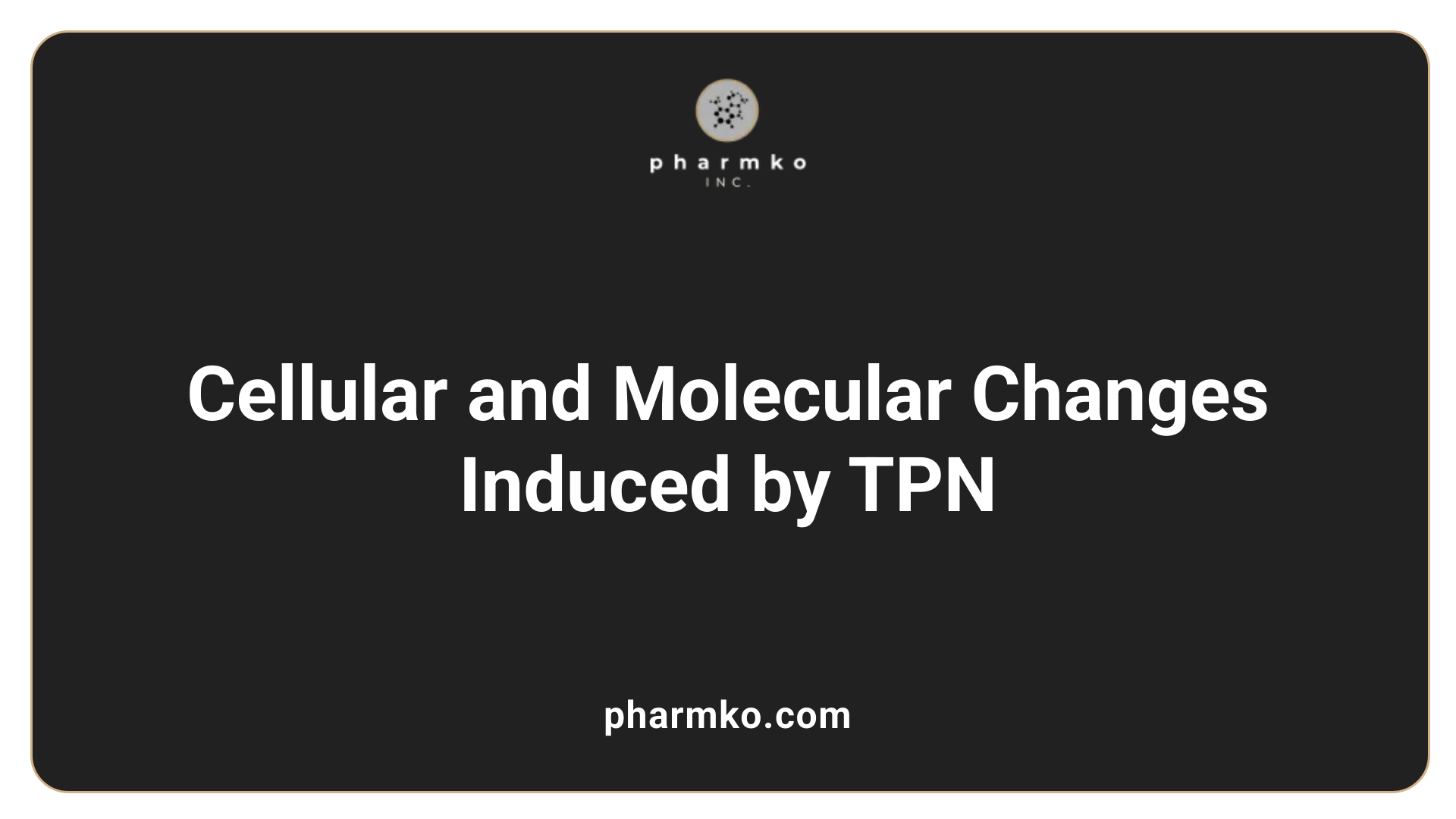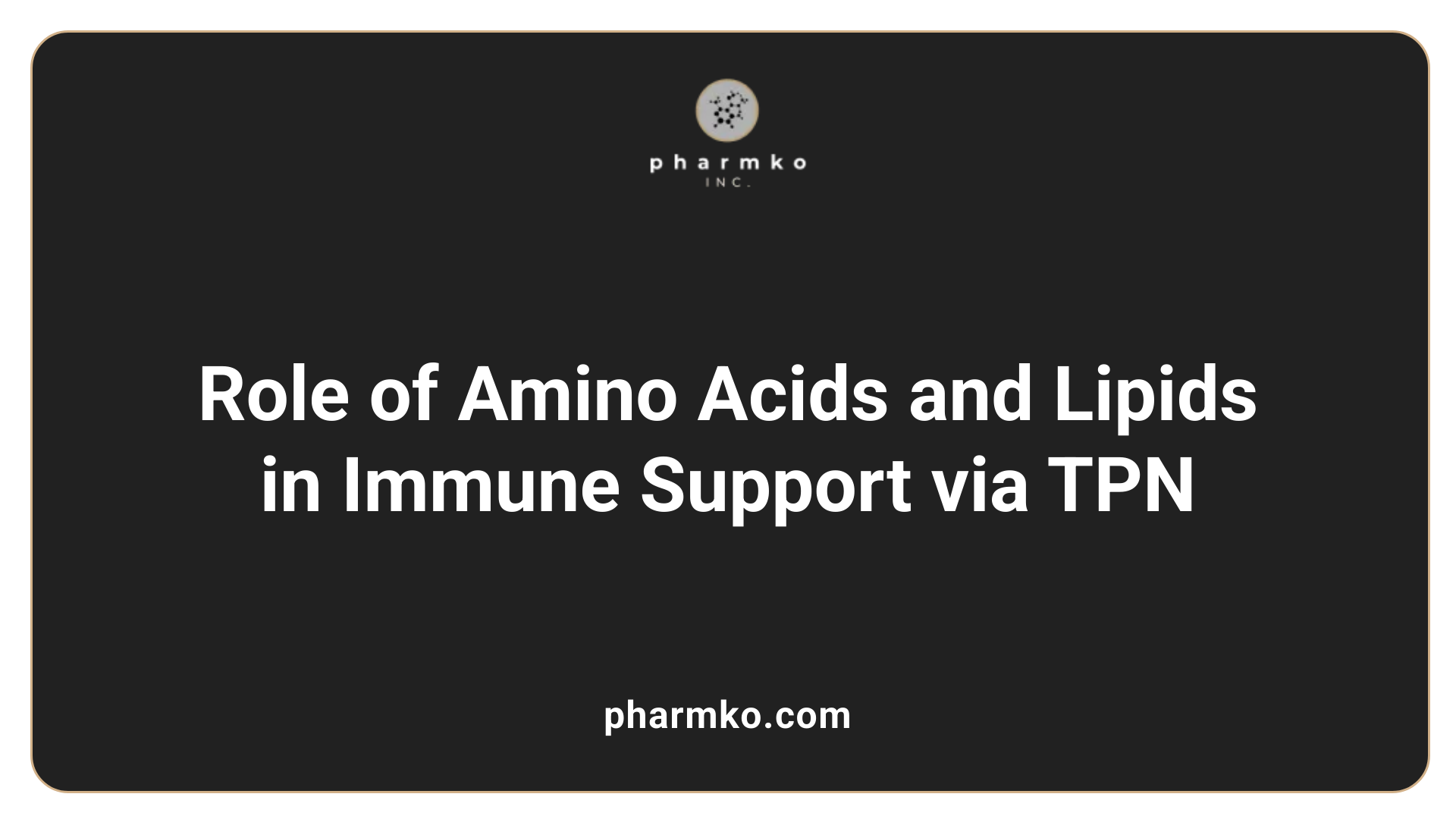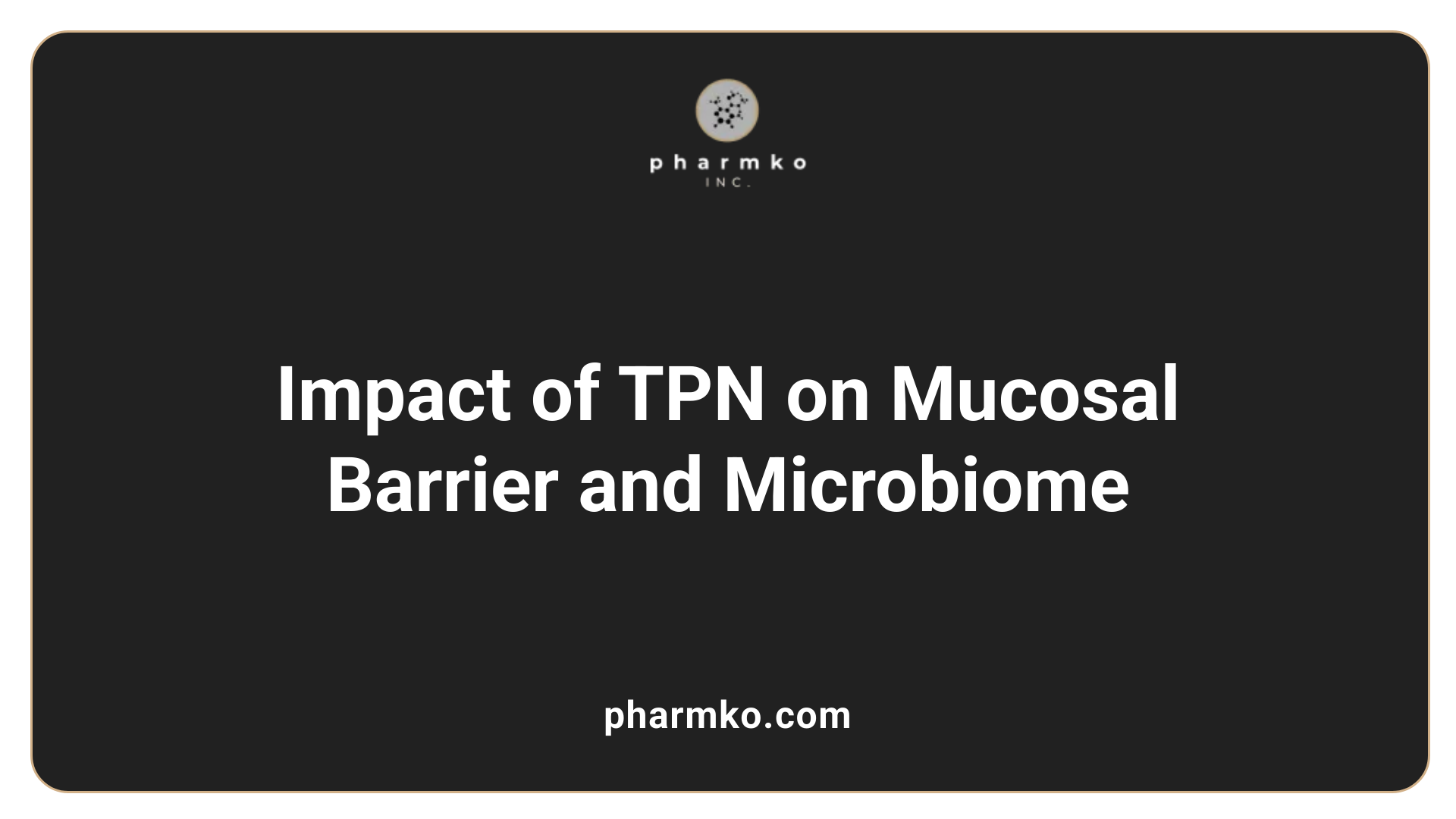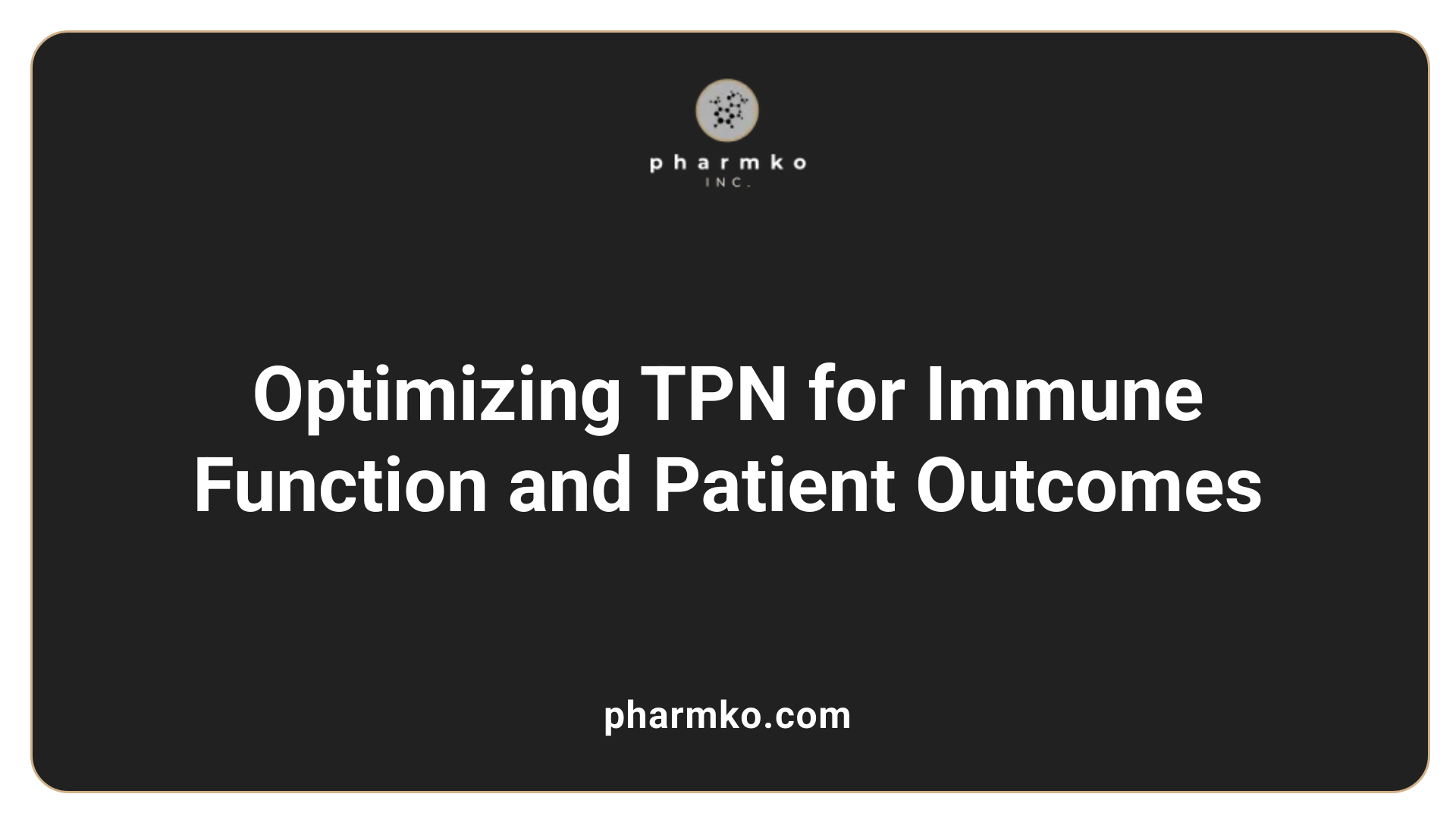The Connection Between TPN and Improved Immune Function
Understanding the Impact of TPN on Immune Enhancement
Total Parenteral Nutrition (TPN) has traditionally been viewed with caution regarding its effects on immune function. However, recent research reveals nuanced interactions where proper formulation and nutrient choices can indeed support immune competence. This article explores the scientific relationship between TPN and immune health, emphasizing how specific nutrients, delivery routes, and supplementation strategies can promote immune system improvements.
The Complex Relationship Between TPN and Immune Function
How does TPN supply nutrients supporting immune cells?
Total Parenteral Nutrition (TPN) provides vital nutrients directly into the bloodstream, bypassing the gastrointestinal tract. This method supplies amino acids, lipids, vitamins, and minerals essential for immune cell growth and function. For example, amino acids like glutamine serve as major energy sources for lymphocytes and macrophages, supporting proliferation and cytokine production. Lipids in TPN, particularly long-chain fatty acids, can influence immune responses, with recent research exploring how altering lipid composition might bolster immunity.
Impact of nutrient composition on immune responses
The formulation of TPN significantly impacts immune outcomes. Enriching TPN with glutamine has been shown in studies to improve T-cell activity and reduce bacterial translocation, especially in systemic inflammatory conditions like SIRS. Similarly, adding short-chain fatty acids (SCFAs) to TPN can support immune recovery after intestinal injury. Conversely, lipid emulsions rich in n−6 polyunsaturated fatty acids (PUFAs) from soybean oil might promote inflammation and impair immune defenses. Innovations include developing lipid emulsions based on coconut or olive oils, which are less likely to provoke inflammatory responses.
Influence of TPN on cytokine production and immune regulation
TPN can modify cytokine profiles and immune cell regulation. Initial effects often show increased prostaglandin E2 production from macrophages, indicating an immunosuppressive phase. Moreover, TPN has been linked to decreased mucosal immune factors like secretory IgA (SIgA), crucial for mucosal defense, including in the nasal passages. This decline correlates with reduced transport or production of IgA, perhaps due to lowered gastrointestinal neuropeptide signaling. Alterations in the microbiome, with reduced beneficial bacteria and increased potential pathogens, further compromise mucosal immunity and overall immune regulation. Nevertheless, nutritional strategies like amino acid supplementation and neuropeptide analogs are under investigation to counteract these immune impairments.
| Aspect | Effect on Immune Function | Additional Notes |
|---|---|---|
| Nutrients Supply | Supports immune cell activity | Glutamine enhances T-cell function, SCFAs support gut immunity |
| Lipid Composition | Influences inflammation | n−3 PUFAs may be beneficial; n−6 PUFAs may promote inflammation |
| Cytokine Production | Modifies immune regulation | Changes observed in prostaglandin E2 and cytokine levels |
| Gut Mucosal Immunity | Often suppressed | Reduced SIgA, decreased mucin expression, microbiome dysbiosis |
| Mucosal Barrier | Potentially impaired | Tight-junction proteins decrease, increased permeability |
How does TPN influence immune response mechanisms?
Research indicates that TPN’s impact on immune function involves multiple pathways. Initially, TPN can cause increased catecholamine secretion (like norepinephrine), which correlates with bacterial translocation from the gut, highlighting a neuroimmune interaction. Furthermore, TPN impairs macrophage microbicidal activity and reduces critical cytokines, contributing to higher infection risk. Amino acid supplementation, especially with glutamine and arginine, has shown promise in restoring immune responses and reducing morbidity.
Adapting TPN formulations by including immunomodulatory nutrients, adjusting lipid sources, and supporting gut neuropeptides are emerging strategies to improve the immune health of patients reliant on this nutritional approach. Continued research aims to optimize TPN compositions to minimize immune suppression and enhance the body’s ability to fight infections.
Cellular and Molecular Impacts of TPN on Immunity
 Total parenteral nutrition (TPN) affects immune function at the cellular and molecular levels in several significant ways. One of the primary effects involves the reduction of crucial cytokines such as tumor necrosis factor-alpha (TNF-alpha) and interleukin-1 alpha (IL-1 alpha). These cytokines are essential for coordinating the body's response to bacterial infections, including promoting inflammation, activating immune cells, and facilitating pathogen clearance.
Total parenteral nutrition (TPN) affects immune function at the cellular and molecular levels in several significant ways. One of the primary effects involves the reduction of crucial cytokines such as tumor necrosis factor-alpha (TNF-alpha) and interleukin-1 alpha (IL-1 alpha). These cytokines are essential for coordinating the body's response to bacterial infections, including promoting inflammation, activating immune cells, and facilitating pathogen clearance.
Research indicates that TPN, especially when administered in supranormal doses, diminishes cytokine production in both infants and adult patients. This reduction leads to weakened local and systemic immune defenses, making the body less capable of fighting infections. For example, decreased cytokine responses result in poorer bacterial clearance and impaired responses in distant organs, which can exacerbate infectious diseases.
Although TPN does not seem to directly inhibit neutrophil phagocytosis, it influences immune signaling pathways and reduces the populations of lymphocytes within gut-associated lymphoid tissue (GALT). This decrease in lymphocytes, including T cells and B cells, compromises mucosal immune responses, making mucosal surfaces more vulnerable to opportunistic pathogens.
At the microbiological level, TPN induces gut atrophy and alters the composition of the microbiota. This commensal shift can further impair immune responses by decreasing beneficial bacteria like Bacteroides fragilis and increasing potentially pathogenic groups such as Proteobacteria. These microbiota changes can promote inflammation and decrease resistance to infection.
Additionally, TPN promotes a shift toward a Th1-dominant immune response, characterized by heightened inflammatory activity but reduced overall immune tolerance and regulation. The net effect is a proinflammatory state that, paradoxically, weakens the host’s ability to respond to new infections effectively.
Overall, TPN impairs immune functionality by disrupting cytokine production, decreasing critical immune cell populations, modifying the microbiota, and altering inflammatory signaling pathways. These cellular and molecular alterations significantly increase the susceptibility to infections, highlighting the importance of carefully managing nutritional support to maintain immune competence.
Nutrient Components and Their Role in Immune Modulation

What effects do TPN components, like amino acids and lipid emulsions, have on immune health?
Total Parenteral Nutrition (TPN) supplies essential nutrients directly into the bloodstream, bypassing the digestive system. The specific components of TPN, particularly amino acids and lipid emulsions, significantly influence immune health.
Amino acids such as glutamine, arginine, and cysteine play pivotal roles in supporting immune cell function. Glutamine serves as a primary energy source for lymphocytes and macrophages, promoting proliferation, cytokine production, and antibody synthesis. Arginine supports nitric oxide production, crucial for microbial killing and immune regulation. Cysteine contributes to glutathione synthesis, protecting immune cells from oxidative stress. Clinical studies have shown that supplementing TPN with these amino acids enhances immune responses, reduces infection rates, and supports recovery.
Lipid emulsions, the main energy source in TPN, contain varying fatty acids that affect inflammation and immunity. Emulsions rich in n−3 polyunsaturated fatty acids (PUFAs), like fish oil, have been linked to anti-inflammatory effects and improved immune modulation. Conversely, emulsions with high n−6 PUFA levels, such as soybean oil, may promote inflammation and impair immune defenses. Recent development of lipid emulsions with less proinflammatory fatty acids, including olive oil (monounsaturated) or coconut oil (medium-chain saturated FAs), aims to reduce adverse immune effects.
Despite these benefits, TPN administration can impair mucosal immunity, decrease secretory IgA production, and cause gut atrophy, leading to increased infection susceptibility. Strategies to optimize nutrient composition—such as adding immune-supportive nutrients, antioxidants, or neuropeptides—are being explored to mitigate these effects and enhance immune recovery.
In summary, the components of TPN, especially amino acids and lipid emulsions, are integral to maintaining immune competence. Tailoring these nutrients to support immune functions can help improve patient outcomes during parenteral nutrition therapy.
Gut and Mucosal Immunity: Effects of TPN

How does TPN influence gut immunity, microbiome, and mucosal immune responses?
Total parenteral nutrition (TPN) has profound effects on the immune functions of the gut. When nutrition is delivered intravenously, bypassing the gastrointestinal (GI) tract, it leads to atrophy of the gut mucosa, which is essential for maintaining healthy immune responses.
One major impact of TPN is the reduction in lymphocyte populations, including T cells and regulatory cells, in Peyer’s patches and lamina propria—key sites for gut immune activity. This decrease hampers the production of secretory IgA (sIgA), a critical antibody for mucosal defense against pathogens.
TPN also alters the intestinal epithelium and decreases the secretion of chemical mediators necessary for barrier integrity. Notably, levels of tight-junction proteins like zonulins, occludins, and claudins decline, leading to increased permeability of the gut lining. Such barrier dysfunction allows easier invasion by opportunistic pathogens.
Furthermore, TPN impacts the gut microbiome, reducing microbial diversity by causing dysbiosis. Beneficial bacteria such as Bacteroides fragilis decrease, while potentially harmful bacteria, including Escherichia coli , Salmonella , and other Proteobacteria, become predominant. This microbial imbalance not only weakens pathogen resistance but also promotes an inflammatory environment.
The altered microbiome and immune landscape favor a shift towards pro-inflammatory responses, with increased Th1 cytokines and neutrophil infiltration into tissues. This inflammatory state can exacerbate barrier breakdown and heighten the risk of systemic infections.
Overall, TPN-induced structural, cellular, and microbial alterations impair the gut’s capacity to mount effective immune responses. These changes elevate the risk of infections, compromise barrier function, and promote systemic inflammation, emphasizing the importance of strategies to preserve gut immunity during nutritional support.
Clinical Perspectives and Future Directions

What clinical evidence exists regarding TPN's effects on immune system function?
Research indicates that total parenteral nutrition (TPN) can both support and impair immune function, depending on its composition and the patient's condition. Clinical studies show that when properly formulated, TPN can restore immune responses in malnourished individuals by increasing immunoglobulins like IgG and IgM, enhancing complement activity, and improving functions like phagocytosis and lymphocyte proliferation. Such improvements help reduce infection risk especially in hospitalized or critically ill patients.
In human blood samples and animal models, TPN has been shown to correct deficiencies caused by malnutrition, such as low lymphocyte counts and weakened primary immune responses. However, some studies highlight concerns about certain ingredients in TPN formulations. Lipid emulsions made from soybean oil, rich in n−6 polyunsaturated fatty acids (PUFA), have been linked to negative effects like decreased cytokine production and increased proinflammatory responses, particularly in infants.
Despite these concerns, recent advances focus on optimizing TPN formulations. Using alternative lipid sources such as fish oil, olive oil, or coconut oil may reduce inflammation and bolster immune defenses. Overall, TPN can support immune health when tailored to individual needs but must be carefully designed to avoid unintended suppression of immune functions.
| Aspect | Findings | Additional Details |
|---|---|---|
| Immune restoration with TPN | Corrects immune deficiencies such as low immunoglobulins, lymphocytes | Supports immune responses in malnourished and hospitalized patients |
| Lipid emulsion effects | High n−6 PUFA may promote inflammation, impair cytokine production | Alternatives like fish oil and coconut oil are being evaluated |
| Microbiome impact | Can cause dysbiosis, increasing pathogens like E. coli , Salmonella | Modulation of lipid composition can influence gut health |
| Route of feeding | Enteral feeding maintains better immunity than TPN | Route influences mucosal IgA, neuropeptides, and cytokine profiles |
Overall, the evidence underscores that TPN can be beneficial if formulated properly, but the potential for immunosuppression driven by specific nutrients, particularly lipid components, demands continued research and careful clinical application. Future strategies aim to refine TPN compositions to maximize immune support while minimizing adverse effects.
Balancing TPN Formulation for Optimized Immune Support
While TPN remains an essential nutritional intervention for patients unable to consume enteral nutrients, its impact on immune function is complex and highly dependent on formulation and administration strategies. Incorporating immune-supportive nutrients like glutamine and omega-3 fatty acids can mitigate some immunosuppressive effects, while minimizing proinflammatory components such as certain lipid emulsions can prevent immune impairment. Ongoing research into microbiome modulation and the development of tailored TPN formulations offers promising avenues for enhancing immune resilience, reducing infections, and improving patient outcomes. Ultimately, personalized nutrition management and continuous evaluation of nutrient composition are key to harnessing the full immunomodulatory potential of TPN.
References
- Total parenteral nutrition and immune system activity: a review
- Cellular immunity changes after total parenteral nutrition enriched ...
- Glutamine-Supplemented Total Parenteral Nutrition Improves Gut ...
- Immune modulation by parenteral lipid emulsions - ScienceDirect.com
- Total parenteral nutrition, bacterial translocation, and host immune ...
- Gastrointestinal immune and microbiome changes during parenteral ...
- Short‐Chain Fatty Acid‐Supplemented Total Parenteral Nutrition ...
- Amino acids and immune function | British Journal of Nutrition
- Amino acids and immune function - Cambridge University Press













